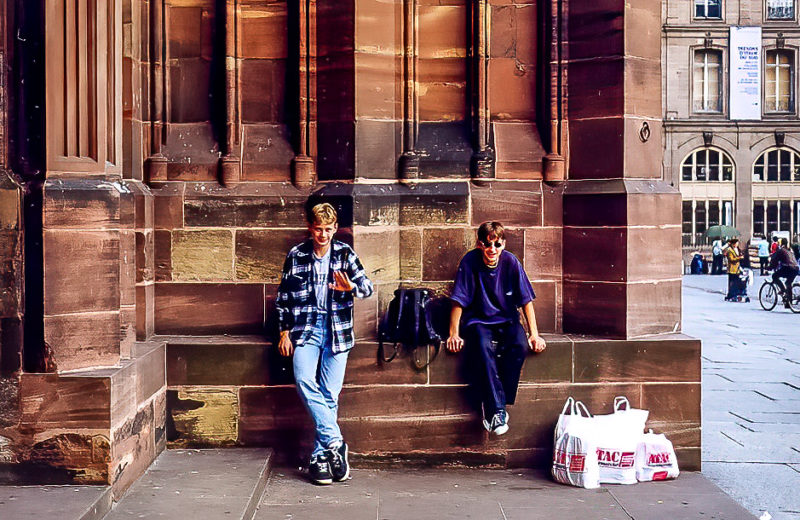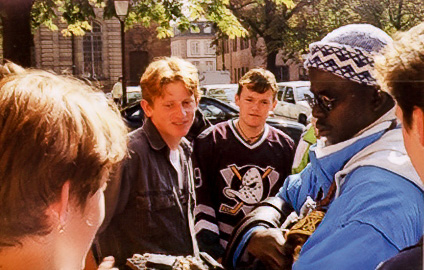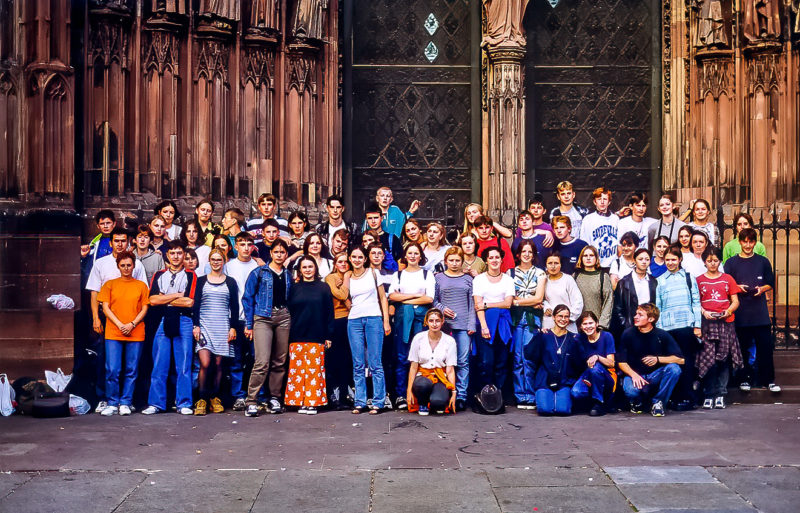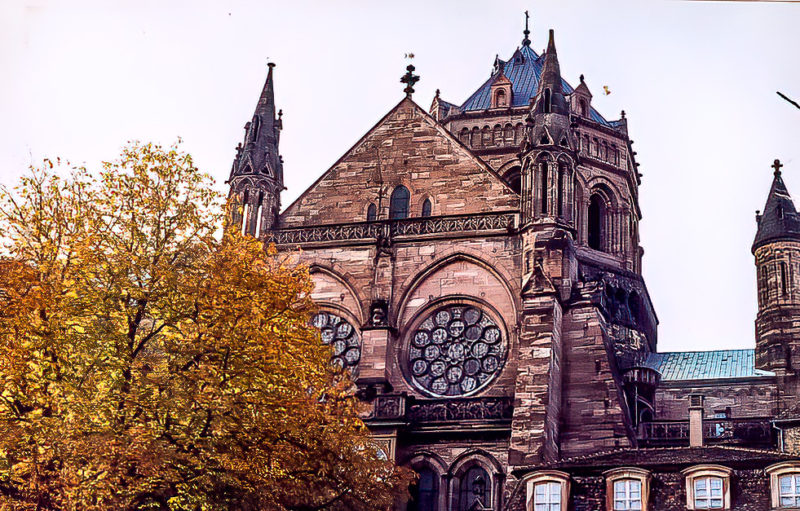I got to see the Polish pope in Poland. It’s not a thing I ever thought I’d be writing. But I did indeed get to see the pope in Ludzmiez on June 7, 1997. (I’m not sure of that spelling, but it will have to do for now.) Not only that, but I went dressed in traditional, góralski clothes. This means itchy woolen pants, knee-high boots, a light cotton shirt, and a heavy woolen vest.
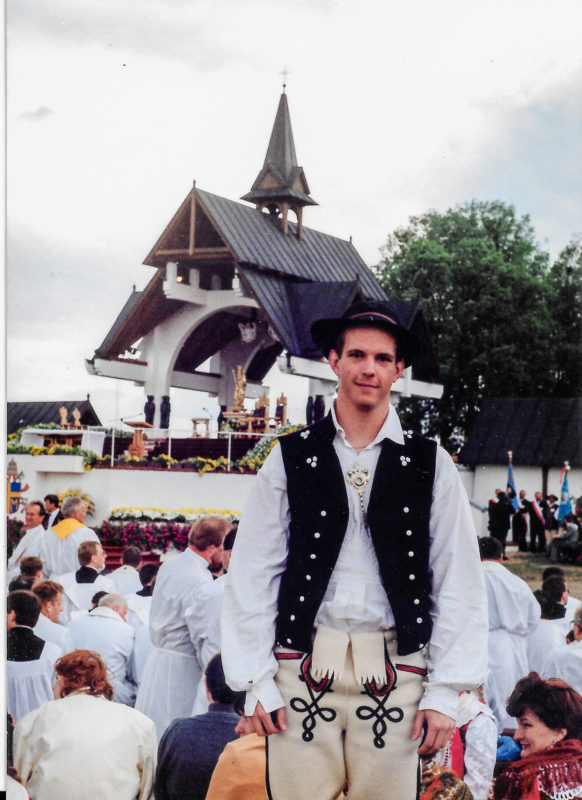
I went with the mayor, his wife, and his daughter (my student). And the mayor being just that – the major – we had great tickets. We were able to park within sight of the church (as opposed to several kilometers away) and we sat in the front, right section. Actually, my ticket was for section A1, but the mayor flashed the tickets together with his on top and we went in with no trouble. We were no more than thirty-five meters away from the podium and altar.

The whole ceremony was outside. There was a large pavilion for the pope and priests and then the people were stretched for several hundred meters along the Czarny Dunejec river. Many people held up banners (including a few in English), and almost everyone had a little yellow and white flag which they waved frantically at certain points.
First, there was a great ceremony at which a high-ranking priest (possibly the current archbishop of Kraków) spoke and the Queen of Podhale icon was brought in and placed on a pedestal in the middle of the pavilion. Four men in góralski clothes brought in the golden statue of Mary holding Jesus as an infant. In her right hand was a scepter. My friend Charles told me that when Karol Wojtyla was still the archbishop of Kraków he made a visit to Ludzmiez and was part of the processional carrying in the Queen of Podhale when suddenly the scepter fell out of her hand and he caught it before it hit the ground. People took this as a sign that he was going to be pope. Of course it’s easy to say that after the fact.
Next, there was a mass, so that meant a lot of standing, kneeling, sitting, kneeling, standing. I sat beside Agnieszka and she told me what to do. The front few rows were reserved for priests, and when it came time to share the host, they took their little urns of saltines and gave them to whomever in the audience wanted to partake. There was a lot of chanting and prayer as usual, but it was interspersed with singing and music.
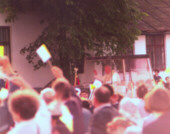
The pope arrived about fifteen minutes late. Wearing his customary white dress, he entered in his customary bullet-proof glass-enclosed car, waving at those who could see him. First he went into a small house that was for those who made pilgrimages to see the Queen of Podhale. Afterward he got back into his protected car and was driven out of sight. Within minutes he appeared on the pavilion. I must say that the people didn’t go as crazy as I was expecting, but there was a great deal of applause and almost everyone was chanting, “Ty jestes Piotrem! Ty jestes Piotrem!” He waved and made a few signs of the cross, then went and bowed before the Queen of Podhale with two other priests flanking him. Someone came and put a red cape over him as he prayed silently, then he began the Hail Mary.
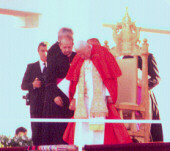
I was surprised when I heard the pope speak. He mumbled almost incoherently. Of course I don’t know Latin and my Polish is still weak, but I couldn’t discern one word from the other. He sounded so tired as if it was all he could do to move his mouth and tongue in order to speak. He seemed to gain some energy as he went along – at least he began speaking more clearly.
After about thirty minutes of doing Hail Marys, the pope spoke for about ten minutes. I couldn’t understand much of what he said at all. I caught a word here and there, but not enough to piece the speech together. I did catch something like, “The world doesn’t know. The world doesn’t understand. But the world needs . . .” and I lost it there. I guess he went on to say that the world needs God, but he didn’t use any vocabulary familiar to me. At this point he went and sat in a huge chair while several people came in pairs and bowed before him, giving him gifts while he blessed them.
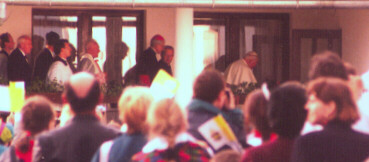
Then he stood and left. That was it. He got back into his protected car and rode back to the pilgrims’ house, then back out to his helicopter and he was gone. We were there from a little after two until about eight, but it didn’t seem that long at all. And the actual presence of the pope seemed incredibly short.
The whole thing was a bit like a concert. There were officials making sure that everyone went to the correct sections. There was the pre-performance energy. There was an opening act. There was the post-performance chaos. And ridiculously priced souvenirs. Is nothing sacred anymore?!
